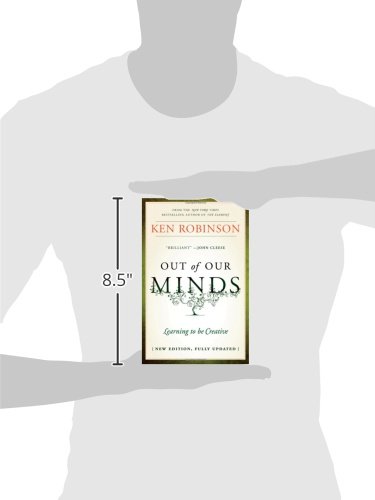All Categories





Out of Our Minds: Learning to be Creative
Share Tweet
Get it between 2024-05-15 to 2024-05-22. Additional 3 business days for provincial shipping.
*Price and Stocks may change without prior notice
*Packaging of actual item may differ from photo shown
- Electrical items MAY be 110 volts.
- 7 Day Return Policy
- All products are genuine and original
- Cash On Delivery/Cash Upon Pickup Available








Out of Our Minds: Learning to be Creative Features
-
Perfect condition, autographed, hardcover
About Out Of Our Minds: Learning To Be Creative
"It is often said that education and training are the keys to the future. They are, but a key can be turned in two directions. Turn it one way andyou lock resources away, even from those they belong to. Turn it the otherway and you release resources and give people back to themselves. To realizeour true creative potential—in our organizations, in our schools and in our communities—we need to think differently about ourselves and to actdifferently towards each other. We must learn to be creative." —Ken Robinson PRAISE FOR OUT OF OUR MINDS "Ken Robinson writes brilliantly about the different ways in which creativity is undervalued and ignored . . . especially in our educational systems." —John Cleese "Out of Our Minds explains why being creative in today'sworld is a vital necessity. This book is not to be missed." —Ken Blanchard, co-author of The One-minute Manager and The Secret "If ever there was a time when creativity was necessary for the survival andgrowth of any organization, it is now. This book, more than any other I know, providesimportant insights on how leaders can evoke and sustain those creative juices." —Warren Bennis, Distinguished Professor of Business, University of Southern California; Thomas S. Murphy Distinguished Rresearch Fellow, Harvard Business School; Best-selling Author, Geeks and Geezers "All corporate leaders should read this book." —Richard Scase, Author and Business Forecaster "This really is a remarkable book. It does for human resources what Rachel Carson's Silent Spring did for the environment." —Wally Olins, Founder, Wolff-olins "Books about creativity are not always creative. Ken Robinson's is a welcome exception" —Mihaly Csikszentmihalyi, c.s. and d.j. Davidson Professor of Psychology, Claremont Graduate University; Director, Quality of Life Research Center; Best-selling Author, Flow "The best analysis I've seen of the disjunction between the kinds of intelligence that we have traditionally honored in schools and the kinds ofcreativity that we need today in our organizations and our society." —Howard Gardner, a. hobbs professor in cognition and education, Harvard Graduate School of Education, Best-selling Author, Frames of Mind Q&A with Sir Ken Robinson Author Sir Ken Robinson What has changed since the first edition of Out of Our Minds was published in 2001 that has prompted you to write this new edition? One of the core themes of the book is the rate and nature of change in the modern world. The last ten years have offered dramatic demonstrations of this theme. Just think of the breathtaking innovations in technology and digital culture. Ten years ago, Google was still a novelty; there were no smart phones, no IPods or IPads; no Twitter or Facebook or any of the social media that are transforming life and work today. Then think of the increasing pace of population growth, the growing strains on the environment and the effects of all of these on people’s lives and future prospects and the fact is that the world is becoming more complex and unpredictable than ever. Ten years on, I wanted to refresh and update the information in the book and to show that these revolutionary changes make the arguments of Out of Our Minds even more urgent in 2011 than they were in 2001. I’ve also spent the last ten years travelling the world presenting and debating the ideas in the book. In this new edition, I also wanted to present the arguments in a fresh way and to include new examples of the strategies that are needed to make them a practical reality. Why do you think this book is important for business and industry leaders as well as educationalists? In the last ten years, I’ve worked with business of all sorts all around the world. For all of them, cultivating creativity is a bottom line issue. Last fall, IBM published a report on the challenges facing business in 2011 and beyond. The report was based on survey of 3000 CEOs. It showed that the top priority for CEOs everywhere is to promote creativity syst

















